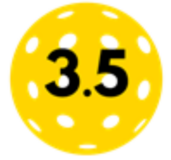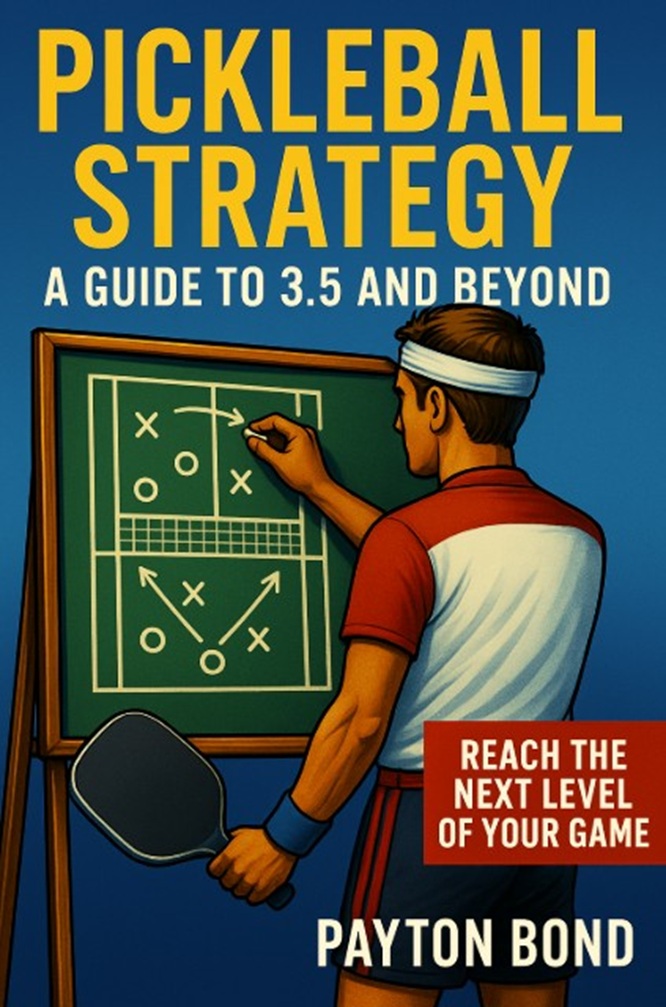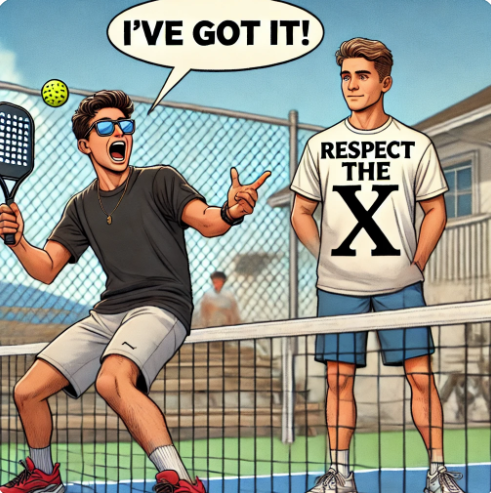
Communication in Pickleball
Ever hesitated on the third shot, unsure if you or your partner should take it? You’re not alone.
When I started playing pickleball, this was one of the most awkward situations in a point for me, and I quickly learned there were two common approaches for handling the third shot:
1. Forehand in the Middle
This approach suggests that the player whose forehand is positioned in the middle should take the shot, even if it requires moving slightly in front of their partner. The rationale is that forehand shots are generally stronger and more controllable than backhands.
2. Respect the X
This strategy involves an imaginary “X” on the court, connecting diagonal players. Respecting the X means that the player on the ball’s natural trajectory should take the shot, even if it requires a backhand.
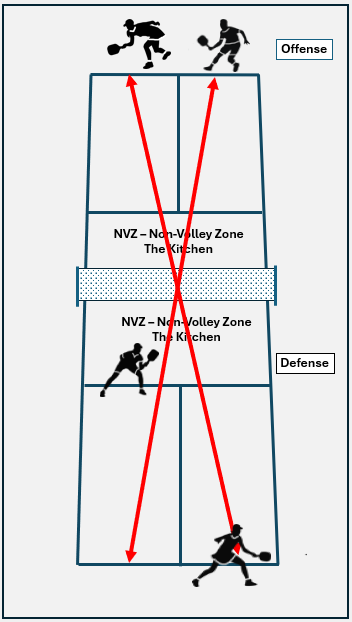
Both strategies have their merits and potential drawbacks.
Forehand in the Middle can lead to players overextending or lunging, leaving their part of the court exposed.
Conversely, Respect the X emphasizes court positioning and coverage but may require more backhand shots.
Regardless of the approach, communication is key.
Why Communication in Pickleball Matters
At times, I hesitated because the ball was angling toward my partner. They’d take a backhand shot, then say, “That was your shot,” especially if they missed. Other times, both of us would move toward the ball, then back off at the last second. We’d either bang paddles, swing late, or, worst of all, let the ball drop between us.
I quickly noticed many players avoid communication, relying on either the forehand rule or Respect the X, hoping for the best rather than ensuring clarity.
As I played more, I made a decision: communication would be part of my game, and I would always use it on the third shot.
The illustration below shows a return of serve and the serve returner advancing to the kitchen line to join their partner.
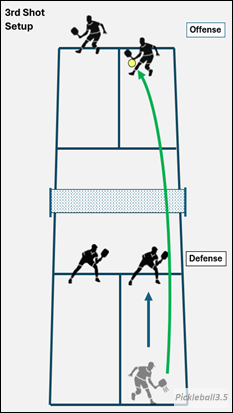
The Third Shot: A Pivotal Moment
The third shot is where communication can make or break a rally. It’s the first shot where either player can step in, making clear calls is essential to executing a winning strategy and avoiding confusion.
A poorly communicated third shot leads to easy points for the opponents.
A well-executed third shot can at least level the playing field by helping you reach the net—or better yet, put pressure on the defense, forcing an error.
Who Should Take the Third Shot?
Unlike the serve or return, the third shot isn’t automatically assigned to one player. Deciding who takes it is critical to avoid hesitation and missed opportunities.
The illustration below shows a player communicating to their partner that they have it and will hit the third shot.
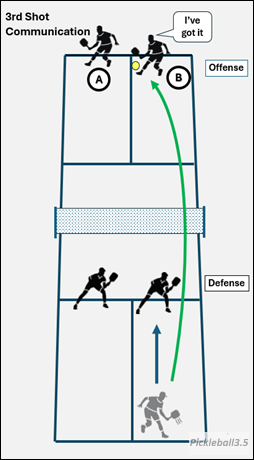
General Rule:
The player with their forehand in the middle should take the lead in calling the shot, not necessarily taking it. If you Respect the X, communication is still needed since the X isn’t always clear.
If the forehand player can take it, they should confidently call “I’ve got it!” and hit the shot.
If they can’t reach it, they should quickly call “You take it!” or “You go!” to ensure their partner is ready.
Righty-lefty pairs with forehands in the middle should decide beforehand who will call the shot.
If your partner isn’t communicating, step in and do it for them. Some players lack confidence or assume it’s unnecessary.
If they aren’t calling the shot, help establish the habit by saying “You go!”, even when it’s obvious. Likewise, if they don’t signal for you to take the shot, step in with “I’ve got it!” to make it clear.
Without clear calls, players hesitate, both go for the shot, or, worse, both assume the other will take it, leading to an awkward or late shot.
Consistent communication is a key pickleball habit and should almost always happen on the third shot.
The Ripple Effect of Third Shot Communication
When players communicate on the third shot, it carries over to other areas, calling lobs, poaches, or dinks. The more consistent the communication, the stronger the team.
Final Thought
Good third-shot communication lays the foundation for strong teamwork throughout every rally. Clear, decisive calls keep both players on the same page and one step ahead of opponents.
At the 3.5+ level, strong players aren’t just technically sound, they communicate effectively. Calling shots confidently keeps both partners in sync and reduces errors.
What Do You Think?
How do you and your partner handle third-shot communication? Are you proactive with calls, or do you rely on instinct and hope for the best?
Check out Payton Bonds new eBook!
Pickleball Strategy – A Guide to 3.5 and Beyond
See it on Amazon.

👤 Follow Payton Bond
All Star and Top Contributor on multiple Facebook Pickleball Forums.
Contributor at TheKitchenPickle.com.
Visit Payton Bonds Facebook Page
